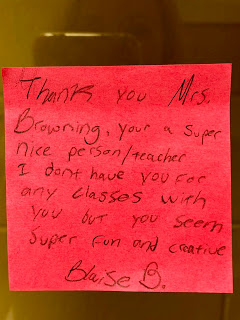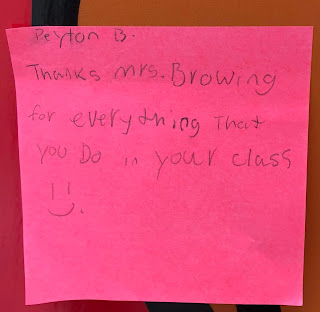Following our Tug-of-War lesson (see previous post), where we debated between the use of electronic books and physical books, my students used their research to create graphic organizers detailing their opinions and three reasons why they came to these conclusions. The writing from their organizers will then be transferred to persuasive writing pieces. They will use the graphic organizers to help plan and type their five-paragraph essay into Google Docs. They will also use a rubric to guide them in opinion writing. The rubric is also useful for peers to provide constructive criticism.
"Reading Gives Us Someplace To Go When We Have To Stay Where We Are!" - Mason Cooley
Monday, November 12, 2018
Monday, November 5, 2018
Tug-of-War E-books vs. Physical Books
My students engaged in a Tug-of-War lesson. This is a thinking routine from Project Zero - Harvard Graduate School of Education. They started the lesson with a thinking question - What is an opinion? Then they turned to a neighbor (think-pair-share) and shared their answers before sharing with the class. We then watched a young adult YouTube blogger give his opinion on the debate between e-books and physical books. After this, we read an article from CBS News and highlighted the important information to support both sides of the debate. They recorded their "supported evidence" in both columns during both the video and using the article differentiated to their reading levels. The students then chose their "tug" (opinion) and placed one of their supporting evidence on a post it and picked a side. After reading other students' "tugs" on the opposite side, they reflected on whether their opinions had changed.


Thursday, October 18, 2018
Kindness Week!
This week was kindness week at BRMS! Every morning we engaged in a kindness activity during homeroom. Today's PBIS lesson was very empowering. The students had to pass a piece of paper around and compliment the person whose name was on the paper. The thing I think my homeroom students really took away from it was that it was easier to receive compliments than to give them. My homeroom had an AHA! moment! "Maybe we should get to know our peers better. Especially the ones where it was more difficult to come up with a compliment." - anonymous student comment
Wednesday, October 17, 2018
Let's Compare and Contrast Our Lives
This week we focused on the reading strategy - compare and contrast. The students created Venn Diagrams to compare Malala's life in Pakistan in 2007 to their lives as children living in the United States. After creating their own graphic organizers, they formed groups to discuss their ideas. In these groups, they recorded their ideas on chart paper. We hung the chart paper around the room and took pictures for our online portfolios. The students then conducted a gallery walk. This is where they walk around the room and analyze their peers' thoughts and ideas on the subject. After the gallery walk, we had an open discussion about the ideas presented. The students were reminded of the definitions of compare (alike) and contrast (different), and how a Venn Diagram is a great way to organize their thoughts when they are trying to analyze how things are alike, different and the same. Enjoy our hard work!!
Tuesday, October 2, 2018
We Are Book Detectives! And Our Connection to Minecraft!
So many times we come across words where we don't know the meaning...and...we haven't charged our phone. Where is Google when you need it?! Well, there are ways to use context to help figure out the meaning of a word. And it doesn't require technology...just a little detective work.
In class, we are using our independent reading books, as well as our read aloud book, I Am Malala, to figure out the meaning of unknown words...without Google. We learned that many times authors tell you the meaning of the word in the actual sentence. Authors provide us with definitions and examples, synonyms/antonyms, and even allow us to substitute other words to see what makes sense, based on the sentence around that pesky word that's holding us back from enjoying our book.
So, all in all, we don't need Google to figure out the meaning of a word. Just put on your detective hats, grab your magnifying glass, and look for clues!
***On a side note, our 7th graders are going to the zoo tomorrow. I searched "context clues" in Achieve 3000 (a non-fiction article source with activities) and came up with an article about welcoming Kimodo Dragons to the zoo. Before my students complete the Achieve 3000 article and activity, I am going to "hook" them by showing them a short Minecraft video where the person creates an area in the zoo for Kimodo Dragons. He offers information on Kimodo Dragons and speaks to their needs, while constructing their habitat. We have now connected Reading to Science, to our field trip, and most importantly, to my students' interests.
We will figure out that word?
We have context clues!
-definition and examples
-synonyms and antonyms
-substitution
Bring it on!!!


Subscribe to:
Posts (Atom)





















































